Hyundai's next-generation CUVs should be good stuff, especially ifthis Nuvis Concept has any influence. An evolution of the Genesisdesign is present in this latest concept vehicle, though we're surethat the super-long Gullwing doors will never make it into a productioncar. (We wish!)
The interior of the Nuvis Concept is created for exactly fourpassengers, rather then a traditional five- or seven-passenger CUVdesign. Hyundai takes things one step further, too -- all of theinterior materials are made from 100 percent recycled materials.Powering the Nuvis is the same BlueHybrid drivetrain system thatHyundai introduced in Los Angeles last year, so this may hint at futureTucson and Santa Fe hybrid vehicles in the future.
Hyundai's press release is available if you click through the post, and check out the Nuvis for yourself in the gallery above.
HYUNDAI NUVIS CONCEPT MAKESHYUNDAI NUVIS CONCEPT MAKES WORLD DEBUT AT NEW YORK AUTO SHOW
NEW YORK, 04/09/2009
The world will have the opportunity to peer into Hyundai's futurewhen the Nuvis concept makes its world debut at the 2009 New York AutoShow.
The Nuvis is the eleventh signature concept car to be designed atthe company's California Design Center in Irvine, Calif. In addition toshowcasing the brand's cutting-edge capabilities, Nuvis also hints at apossible design direction for a future-generation crossover, blendingattributes of a tall urban car and a premium utility vehicle.
Consistent with Hyundai's pledge to lead all brands in U.S. fueleconomy by 2015, Nuvis is powered by Hyundai's Hybrid Blue Drivearchitecture, which uses breakthrough lithium polymer batterytechnology.
EVOLUTION OF THE DESIGN
In developing the initial sketches, Hyundai designers consideredthe interplay of natural, fluid elements with more rigid surfaces andstructures to create the illusion of constant motion. Specifically,designers studied the way water splits across and flows around the hulland sides of a boat, creating a wake, or the way wind shapes asnowdrift or flurries through trees. The living power of these elementsis reflected in the Nuvis' design.
"Our goal was to create a living machine, constantly moving, thatthe driver and passengers could be part of," said John Krsteski,Hyundai Design manager. "There are no lines on or in this car that arestanding still."
In addition to invoking the impression of irrepressible motion,the Hyundai design team took more practical matters into account aswell. Nuvis is designed to accommodate the diverse interests of amodern, active couple. The Nuvis is meant to be comfortable startingits day at a desert retreat, arriving at the ski slopes in theafternoon and then cruising to a formal dinner that evening.
The design team sought to create a vehicle that would complementits environment, without making a negative impact. The versatility ofthe vehicle's design, combined with Hyundai's Hybrid Blue Drivetechnology, accomplishes exactly this.
EXTERIOR DESIGN
The Nuvis has an assertive face demonstrated by the strong,hour-glass shape that frames the blue acrylic shield grille andaggressive headlamps, whose two glowing white rings are offset by apair of red rings on the tail lights.
Perched on top of 22-inch wheels, Nuvis' proportions are tall,strong and protective. The two body-side lines set up a flowing watereffect, giving the appearance of motion.
In addition to the dynamic angles and firm stance, the Nuvis boasts a host of unique exterior elements.
"One of the coolest attributes of Nuvis is that the protectiveroof appears to float on top of the body through the use of hiddenpillars and high-contrast glass," said Andre Hudson, Hyundai seniordesigner. "This effect starts at the headlamps and is carried all theway through to the taillights producing a tall, strong body-side andrear."
Large, gull-wing doors, either opened or closed, create uniquefront, rear and profile views. Blue ambient lighting cast across thebody adds to the overall upscale feel of the vehicle.
An additional design element featured on the Nuvis is a brushedaluminum accent that spans the entire length of the vehicle. Normally,this type of trim is only found around the windows. On the Nuvis, thistrim extends out from the headlamps, juts up along the hood and throughthe beltline, across the top and into the rear spoiler.
INTERIOR DESIGN
In keeping with the exterior design scheme, the Nuvis' spaciousand luxurious interior is dominated by a cool, blue acrylic centerstack that ebbs and surges in the manner of a river. The cascadingfloor, with its blue ambient lighting, further enhances an environmentin which seamless technology flows, enveloping both the driver andpassengers.
A current of information coming from the instrument panel streamsthroughout the cockpit, as passengers are able to access each other viaMethode Electronics TouchSense® technology that links all fourbusiness-class seats. The car's infotainment system is fed by channelsfrom the outside – the occupants, for instance, can learn of arestaurant's specials that evening as they drive past it.
The sculptured, comfortable seats are custom woven with agraduated fabric that is finished in a silver-to-black sunburst. Theecologically friendly seating fabric is provided by True Textiles, theindustry's leading provider of environmentally responsible textilesolutions. The Nuvis fabric is made from 100 percent post-consumerrecycled polyester – reclaimed soda bottles – and increasinglysustainable manufacturing processes. Hyundai collaborated with TrueCreative to produce this unique fabric with an 80-inch repeat,providing a fabric that is as attractive to the environment as it is tothe viewer. The matching seatbelts are provided by Harveys OriginalSeatbeltbags, a well- known manufacturer of handbags made out ofseatbelt. Harveys also developed two matching handbags for the Nuvisconcept.
In the rear, a high trunk floor houses the Nuvis' lithium polymer battery pack.
HYUNDAI'S HYBRID BLUE DRIVE ARCHITECTURE
Hyundai's all-new, homegrown Hybrid Blue Drive architecture helpsdefine the Nuvis concept. Hyundai's proprietary parallel hybrid drivesystem mates the already-fuel efficient 2.4-liter Theta II engine to a6-speed automatic transmission and a 30kW (205 N-m) electric motor formaximum fuel economy.
Hybrid Blue Drive has an all-electric mode and a parallel drivemode, meaning that the wheels are turned by power coming directly fromthe gasoline engine, or the electric motor, or both together, asconditions demand. This parallel hybrid drive architecture will serveas the foundation for future Hyundai hybrid drive vehicles, startingwith the next-generation Sonata in the United States.
To maximize fuel economy, all of the Theta II's major drivelineand cooling system components have been optimized to reduce friction,while the crankcase has been filled with low friction oil.
Engine management software automatically shuts off the enginewhen the vehicle comes to a halt, cutting emissions to zero. The engineautomatically restarts when pressure is reapplied to the acceleratorpedal due to the Integrated Starter Generator (ISG).
To further reduce fuel consumption, the Theta II's enginemanagement software, which governs injection pressure, engine cycletiming and exhaust retreatment rates, has been revised. This controlstrategy assures that maximum efficiency is achieved during gentleacceleration, while greater power is immediately available during fullacceleration.
During deceleration, regenerative braking also comes into play to help conserve energy.
To ensure that the engine runs at lower RPMs, the top three gearratios in the transmission have been extended. Fuel economy is furtheroptimized through the latest electric motor-assisted steering systemwhich reduces power drain and low resistance tires.
The nine major components of Hyundai's Hybrid Blue Drive include:
1. An efficient 30kW electric motor, delivering 205 N-m of torque
2. A regenerative braking system
3. An integrated starter generator that enables the engine to turn off at stops and restart automatically under acceleration
4. A breakthrough lithium polymer battery package, with 5.3 Ah of capacity at 270 volts
5. Optimized Theta II 2.4-liter engine
6. 6-speed automatic transmission with an improved-efficiency electric oil pump
7. Weight-efficient architecture coupled with a low drag coefficient
8. Electric air conditioning compressor
9. Hybrid power control unit
LITHIUM POLYMER BATTERY TECHNOLOGY
Hyundai's hybrid system stores its electrical charge in a 270Vlithium polymer rechargeable battery (5.3Ah/270V) that surpasses bothexisting nickel-metal hydride and pending lithium-ion applications.Lithium polymer batteries are more durable and space-efficient thanother, bulkier hybrid batteries.
SPECIFICATIONS
Configuration
Crossover utility vehicle
Engine
Hybrid Blue Drive and a 30kW (205 N-m) electric motor
Transmission
6-speed automatic
Horsepower
228 hp (estimated)
Battery technology
Lithium polymer (5.3 Ah of capacity at 270 volts)
Weight
3400 lbs.
Overall length
188.3 inches
Overall width
77.6 inches
Overall height
65.3 inches
Wheels
22 inches
Tires
Hankook
Fuel economy
34 mpg city / 35 mpg highway (estimated)
Touch sensors
Provided Methode Electronics TouchSense® technology

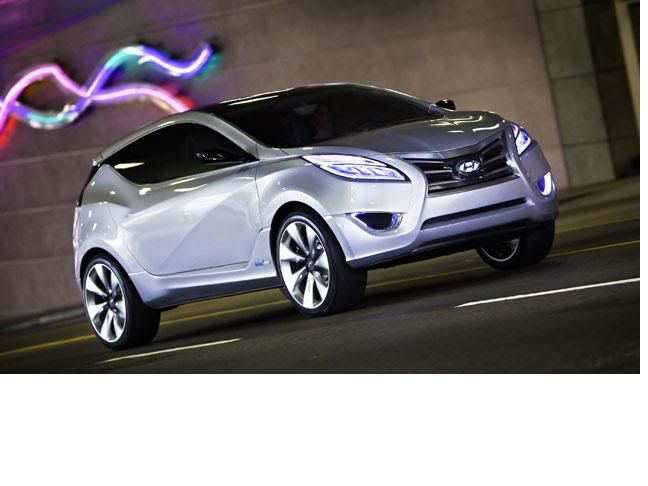

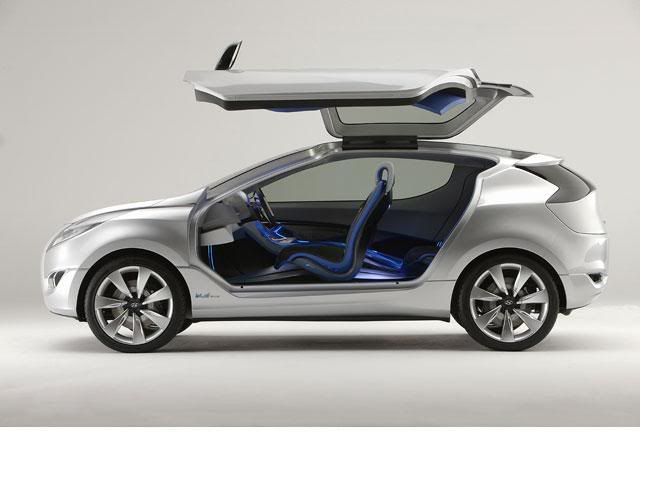
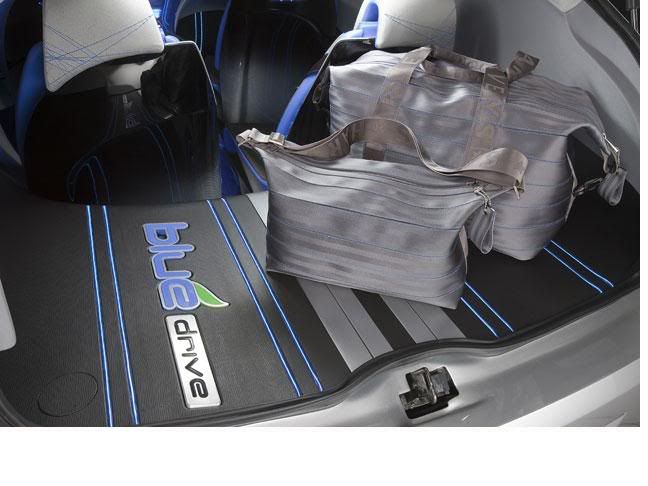
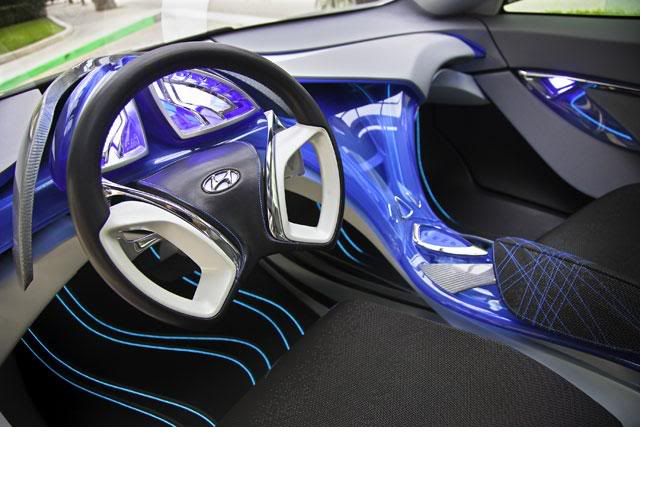
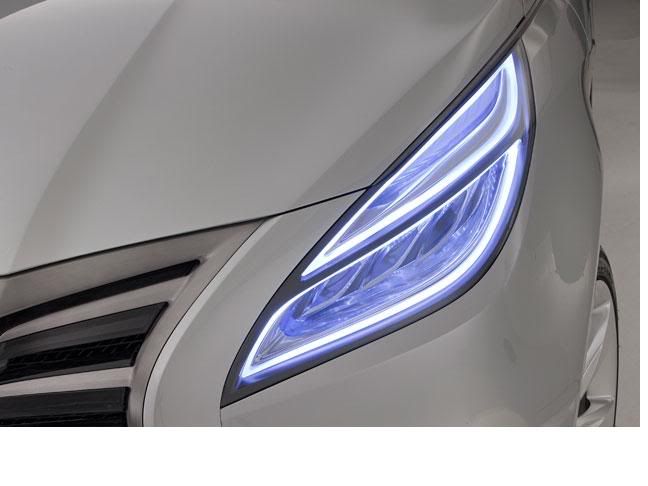






|




